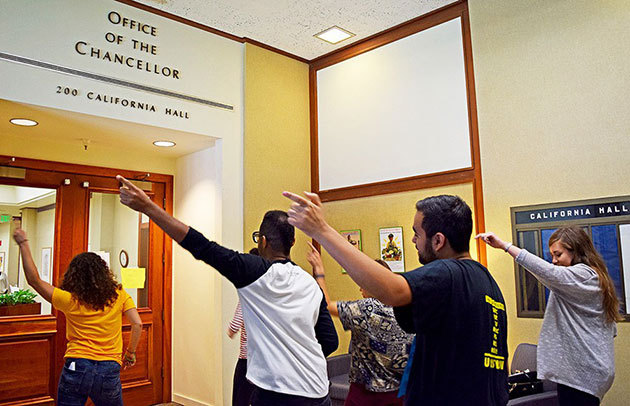Demonstrators sing in California Hall to protest UC Berkeley’s use of contract workers

By Melissa Wen
Demonstrators performed a song and dance inside California Hall on Tuesday, calling out the administration for being “super cheap,” and marking the start of a new campaign for the campus to create more union jobs instead of hiring contract workers.
At about noon, a group of about a dozen students and workers combined gathered before the doors of Chancellor Nicholas Dirks’ office, carrying a letter and a cake decorated with the phrase, “I don’t always pay fair wages, but when I do it’s in Berkeley and Richmond.” They sang an original song, based on the song “Super Freak,” with lyrics criticizing the administrators for treating workers unfairly.
“He’s a very stingy chancellor, treating workers hella unfair,” the lyrics said. “All they want is living wages, UC jobs and decent health care.”
The protest kicked off increased efforts against the university’s contracting out of services, a practice that has been criticized because contract workers often have fewer protections than UC workers. The university maintains, though, that hiring a mix of contract and UC workers allows “maximizing efficiency within resource constraints,” as UC Legislative Director Jason Murphy wrote in a letter to state legislators.
After requesting through the door to speak to Dirks or another administrator, demonstrators were not let inside the office. They instead left the cake outside and handed their letter to UCPD Capt. Alex Yao, who arrived, along with several other police officers, and offered to pass the message along to administrators.
“The purpose of this is to keep pressure on Dirks over the summer,” said Kristian Kim, a UC Berkeley senior and member of the campus’ Student Labor Committee. “He doesn’t get to relax and forget about all the people who are making this institution run.”
Although related to a universitywide campaign, the Tuesday protest was directed toward UC Berkeley’s use or potential use of contract workers — particularly in the ongoing reform of certain campus services, the development of Lower Sproul and the creation of the Berkeley Global Campus at Richmond Bay.
The UC contract with the American Federation of State, County and Municipal Employees union prohibits UC campuses from contracting out only because of the savings resulting from paying lower wages and benefits for services normally performed by AFSCME workers. The university may contract out work if it needs to obtain special services and equipment not available internally or if the work would not be economically feasible if performed by UC workers, among other scenarios.
Demonstrators criticized contracted jobs as contributing to poverty, citing a 2012 study by Miranda Dietz, then a campus Goldman School of Public Policy student and currently a research data analyst at UC Berkeley’s Center for Labor Research and Education. The study shows that temporary workers in California received lower wages and were twice as likely as nontemporary employees to live in poverty, receive food stamps and be on Medicaid.
“Tuition goes up — why get less quality work?” said Eugene Stokes, a union member and campus maintenance worker, while speaking at the Tuesday protest.
According to Rosella Bearden, a UC Berkeley senior who participated in the demonstration, the new campaign — called Justice 4 UC Workers — is built partly on the ongoing push for the campus to sign a community benefits agreement to ensure that the development of its new Richmond campus provides adequate benefits to workers.
Other efforts to improve the conditions of contract workers include Senate Bill 376: proposed legislation that would require potential contractors to certify with the university that the contractors’ bid includes employee compensation and benefits that generally match what is provided to UC employees performing comparable work.
The university opposes SB 376. The letter written by Murphy explains that the bill could limit the university’s ability to contract out for specialized services and could increase prices the university must pay for contracts by about $66 million per year.
“UC takes the contracting issues raised by supporters of SB 376 seriously and we are dedicated to continuing to address their concerns,” the letter said.
[Source]: Daily Californian


